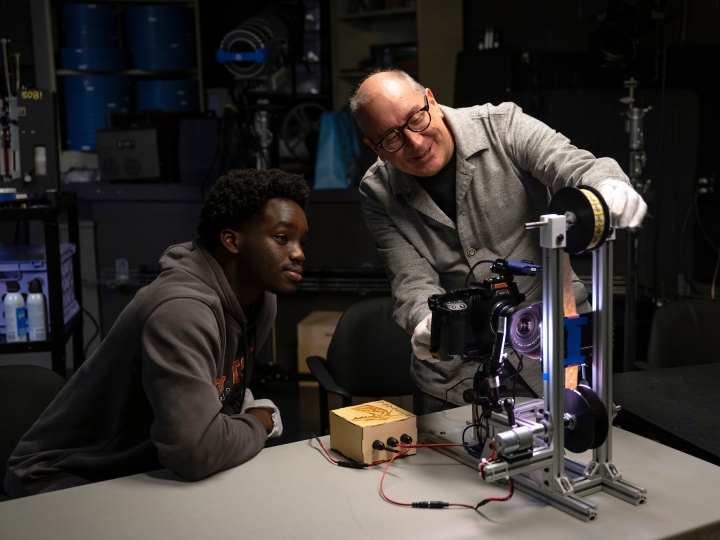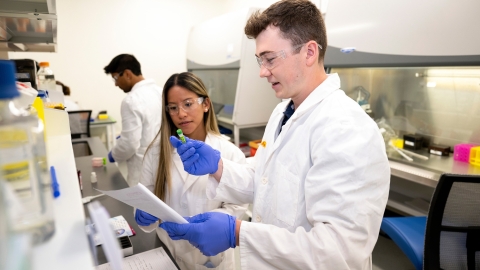
A Summer of Discovery
July 21, 2023
Professor Olivia Boerman is leading a biomedical engineering research team, which includes Connor Kozick '26, in studying the effectiveness of ultrasound as a treatment for chronic wounds. Photo by Emily Paine, Marketing & Communications
Research at Bucknell doesn't take a summer break. More than 250 Bucknell students are spending their summer conducting experiments, delving into archives and exploring creative questions to make meaningful discoveries.
Bucknell's Office of Undergraduate Fellowships and Research connects students with programs both within the University and with external organizations that advance what they've learned in the classroom and enable them to develop new skill sets that will benefit their future studies and careers.
Two such programs — Bucknell's Emerging Scholars Summer Research, Scholarship & Creavity Program and the Bucknell Program for Undergraduate Research — create and nurture a collaborative community of research scholars on campus for eight to 10 weeks each summer. Bucknell removes financial barriers to participation by providing free campus housing and a stipend to cover students' living expenses so students can fully immerse themselves in their research.
"Bucknell makes a significant investment in supporting undergraduate research and ensuring that there is support for students' scholarly interests," says Margaret Marr, director of Undergraduate Fellowships and Research. "Students develop meaningful, lifelong relationships with their research mentors while learning valuable, transferable skills, like teamwork and communication."
Throughout the summer, the Office of Undergraduate Fellowships and Research organizes weekly gatherings for researchers and mentors. These community-building events enhance students' social networks while demonstrating the value of interdisciplinary collaboration. "Having an opportunity to discuss their work with a person in a different discipline can bring a new perspective and spark an idea that helps to advance their work," Marr says. "They are investigating things others have never investigated before, which means they'll inevitably encounter obstacles they'll need to overcome. Every employer I've ever met likes to hire problem-solvers."
Meet three of these problem-solvers.
Amanda Agambire '26, computer science
Research problem: Can we trust biometrics?
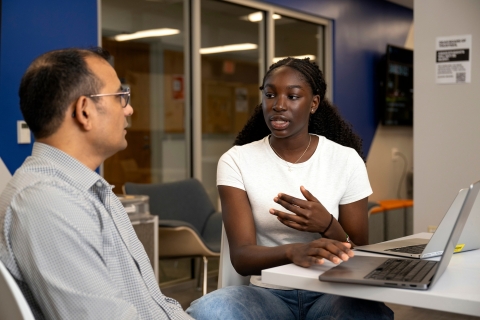
Amanda Agambire '26 is collaborating with Professor Rajesh Kumar, computer science, to investigate if gait recognition systems are biased. Photo by Emily Paine, Communications
Amanda Agambire '26 knows there are benefits to using biometrics for identification purposes. In 2020, her native country of Ghana experienced its highest voter turnout in history — 79% for a presidential election (even during a pandemic) — thanks to a biometric system that used fingerprint recognition to help identify, register and verify voters.
But as a student researcher, working under the guidance of Professor Rajesh Kumar, computer science, Agambire is also aware of the shortcomings of technology. For example, it has been reported that facial recognition systems more frequently falsely identify Black and Asian faces more than Caucasian faces and have lower error rates in recognizing males compared to females.
Agambire is receiving funding from Bucknell's College of Engineering to investigate if a similar bias exists in other biometrics, specifically wearable sensor-based gait recognition systems that identify a person by the way they walk.
There are many potential applications for this technology. The U.S. Defense Information Systems Agency, for example, has identified gait as an important biometric because facial or fingerprint recognition is challenging if military personnel are wearing gloves, goggles and helmets. Car manufacturers are also interested: If your vehicle is outfitted with gait recognition, it could unlock, start and apply personalized settings automatically as you approach it.
If these systems are biased — if they misidentify older people more often than younger people, women more than men, or one race more than another — that would be problematic, Agambire says.
"We currently don't know if there is a demographic bias in gait recognition," she says. "The ultimate goal is to eliminate bias in technology, and in order to do that, we first need to understand if it exists."
Agambire is analyzing datasets and working to develop and train an algorithm that will detect patterns to show if certain populations are consistently mis-authenticated or misidentified. Agambire started the project knowing the coding language Python but needed to teach herself data-science tools, including NumPy, Pandas and Scikit-learn to conduct this research.
"I like problem-solving; I find it quite interesting to use tools and data to uncover information that can impact others," she says. "As society immerses itself in technology, it's important that we are using systems that are equal and accurate for everyone."
Brooke Corpuz '26, English — creative writing and economics
Research problem: How can novelists incorporate different identities into their work successfully?
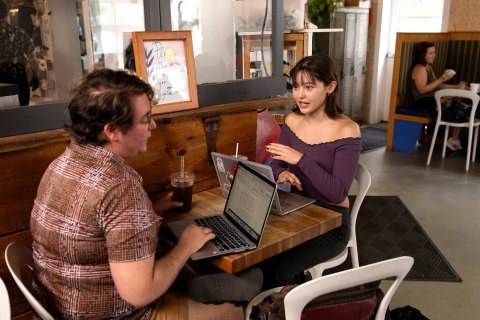
Brooke Corpuz '26 is conducting research under the guidance of Professor Chase Gregory, English, to help writers incorporate diverse characters into their writing.
During the fall 2022 semester, Brooke Corpuz '26 had only been on campus for a few weeks, when Marr visited their Residential College to encourage students to conduct summer research. "I had assumed those types of programs were for science majors," Corpuz says. "When I learned that they included humanities projects, I thought, 'I should really take advantage of this.' It's kind of crazy that an idea I generated is invested in. I feel so grateful."
As an Emerging Scholar, Corpuz is working to understand how novelists avoid cultural appropriation and stereotyping in their portrayal of diverse characters. They are conducting a literary review under the guidance of Professor Chase Gregory, English, to study how authors approach the inclusion of various identities — spanning race, culture, gender and sexuality — and intend to create an online guide for aspiring writers at Bucknell on how to be thoughtfully inclusive.
"I think novels, when done well, are empathy machines," Corpuz says. "They help you understand other people, their experiences and their identities. The lack of diversity in American literature has damaged this process by misrepresenting marginalized identities."
Through their research, Corpuz is developing best practices that authors can adapt to strengthen their language, knowledge and empathy. These include: examining their internal biases by asking why they want to include this identity in their work; being in community with the kinds of people they are writing about; reading books written by authors who have that identity; receiving criticism from members of that community.
To help them better understand the challenges authors face when writing from a perspective other than their own, Corpuz is simultaneously writing a novel whose main character is a trans man. What Corpuz is uncovering in their own writing process is enhancing their research — and vice versa. "I think the key is getting people to be humble, and say, I don't know about this experience but I want to understand so I can learn and write better," says Corpuz, who is a Posse Scholar from Clarksburg, Md. "I think that's a good universal lesson for everyone."
Connor Kozick '26, biomedical engineering
Research problem: How does ultrasound therapy heal chronic wounds?
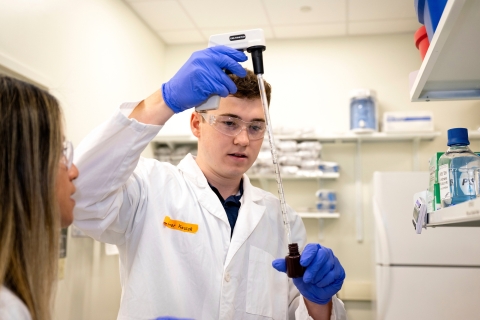
Connor Kozick '26 is working with Professor Olivia Boerman, biomedical engineering, to determine if endothelial cells exposed to ultrasound contribute to the body's healing process. Photo by Emily Paine, Communications
Connor Kozick '26 is one of seven biomedical engineering majors investigating the effectiveness of ultrasound as a treatment for chronic wounds. The team's research mentor, Professor Olivia Boerman, biomedical engineering, uncovered in her own research as a doctoral student that a weekly 15-minute ultrasound treatment can significantly reduce the healing time of diabetic foot and venous leg ulcers — from 12 months to four weeks.
How? That's where Kozick and his labmates come in. While Boerman and her research team showed the effectiveness of ultrasound treatment in human trials, to get therapeutic ultrasound approved as a commercialized device — providing a more affordable, effective alternative to medications and invasive procedures — the medical community needs to understand exactly how it works.
To achieve that goal, each of Boerman's student researchers is working on a piece of the puzzle. For his part, Kozick is investigating the role of endothelial cells, which line the inside of blood vessels and are known to contribute to the body's healing process. These cells are also known to be particularly sensitive to mechanical stimuli like ultrasounds.
"I'm looking to see if endothelial cells exposed to ultrasound secrete a specific protein that contributes to the generation of blood vessels," says Kozick, who is from Danville, Pa. "If we see an increase of this protein, it could indicate that the ultrasound promotes the growth of blood vessels, which could be responsible for the advanced healing — or not. Even if we show that it's not a factor, that's valuable to know because it eliminates it as a possibility."
Kozick, who is participating in Bucknell's Emerging Scholars program, says it's been a gratifying experience. "I feel like I'm doing something that carries weight," he says, "not just as a resume builder, but that I'm contributing to something that can help others and benefit society."

